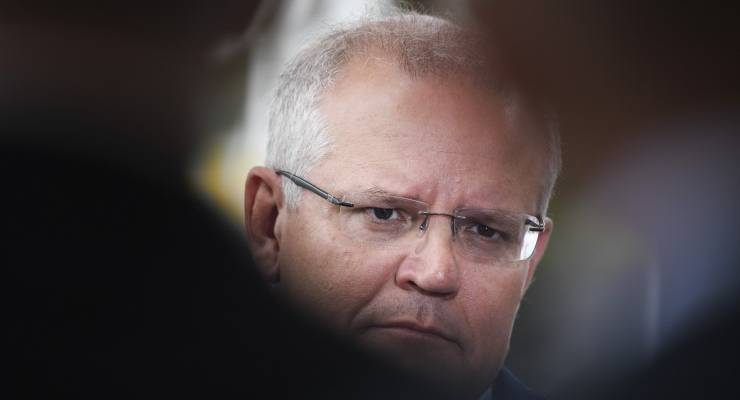
In one of the more puerile moments of media coverage of the economic impacts of the coronavirus crisis, The Australian Financial Review — usually the stalwart supporter of punitive interest rate rises and government austerity — today called for “Team Australia, a coordinated effort between the federal government, the Reserve Bank and the big four banks in the face of a global COVID-19 pandemic”.
After yesterday’s interest rate cut, we’re still waiting to see what the federal government brings to the table in terms of fiscal stimulus, with assurances that the rhetorical switch from last week’s key word “modest” to this week’s “measured” reflects a bigger package than previously planned.
The problem that policymakers face, and that the senior writers at the AFR miss, is that the receptivity of voters to any “Team Australia” approach is in serious question.
It’s not merely that, as Crikey noted yesterday, consumers are much less likely to spend any stimulus, whether monetary or fiscal, after years of wage stagnation, compared to their response to the Rudd-Swan government’s stimulus efforts.
It’s that Australians simply do not trust government, and do not trust this government in particular.
That was a point Leigh Sales effectively made against a dodging, weaving Scott Morrison last night on 7.30. How can voters trust the government on big issues like the impact of the coronavirus when they can’t trust it on smaller-scale issues: corruption around the sports grants program, the forged document affair, Morrison’s evasion of questions about his relationship with Hillsong pastor Brian Houston or his holiday in Hawaii?
Morrison’s response was to accuse Sales of parroting Labor talking points.
Morrison’s government has persistently shown it puts its own interests above the national interest, and voters know it. Why would they assume it is doing anything different around the response to the coronavirus crisis, even if they agree with it?
There’s a bigger problem than that, however, and it goes beyond Morrison.
A decade ago, levels of trust in government were at extraordinary highs following the election of the Rudd government. According to the ANU Election Study, in 2007 86% of respondents were “satisfied with democracy”, 43% thought people in government could be trusted and 38% of people thought government was run for “a few big interests”.
Now, just 59% of respondents are satisfied with democracy, 25% say people in government can be trusted and 56% say government is run for a few big interests. In each case, 2007 represented a recent historic high in voter trust in government, while 2019 represents a recent, or all-time, historic low in trust.
After a decade of incessant leadership changes, constant lying by political leaders, inaction on climate change, learned helplessness via outsourcing and privatisation and persistent stagnation in living standards, voters have turned on the governing class — and turned hard.
Even if Scott Morrison accepted a need for a “Rudd-style cash splash”, he couldn’t deliver it, because neither he nor any other prime minister of recent times is trusted like Rudd was, briefly, by voters as the financial crisis erupted.
Within a couple of years, voters no longer trusted Rudd himself much either — and with good reason — but they looked to him and his team for leadership in 2008 and got it.
Without that trust, there can be no “Team Australia” or any other glib slogans the media invents. There’s no Team Australia without the people who make up our democracy, the people who spend, who work, who run business, who invest and save.
And they’re exactly the people our governing class has spent a decade alienating.
There was little panic during the financial crisis. People worried about whether their money would be safe in the banks, but Rudd, Wayne Swan, Glenn Stevens and Ken Henry calmed their fears and then bolstered their confidence.
Now there’s panic buying of essentials. Commentators blame the media’s hysterics but it also betrays a lack of confidence that the current generation of leaders is even interested in governing for all Australians, rather than a few influential sectors.
The positive side of all that is, if Morrison can overcome that trust deficit and get Australians to believe in his leadership and government, that will be a huge plus in shoring up the economy — but might also be a turning point in the alienation of voters from Australia’s democracy.
And that would be an achievement to rival our defence against the financial crisis.








He’s out of his depth….
I thought it was Cap’n Tone Abbott, the master of glib slogans, wot invented Team Australia.
I think it has been re-badged and relaunched.
Personally I think Team Australia died when Team Abbott did everything to win an election regardless of the benefit or detriment to wider Australia. Times changed then and still it’s all about trashing the opposition at every opportunity.
Talk about talkin’ up the animal spirits .It’s gonna need a lot of con to get the con back in confidence. Here’s hopin’ there’s a lot more smarter cleverer people than me ,that’ll fall for it..
“If Morrison can overcome that trust deficit…”
As big ifs go, that is one of the biggest I have ever seen, and I have been around a fair while..!!
I think Morrison’s burnt his bridges. I had to turn off the “7:30” interview halfway through because I couldn’t tolerate any more ducking and weaving and evading. Trust has to be earned and once thrown away it’s almost impossible to retrieve. Can we get a government we trust now? Albo’s got a hard row to home to get public trust for the ALP but he’s got a slightly better chance than the present Government.
hard row to hoe
@Rais ..I think you’ll find good historical political evidence that ‘the Australian trust’ can be bought/bribed for, if not for a song ,at least not for a ransom. Mind you ,it only takes a focus group swinging amount of trust .
“….row to hoe….”